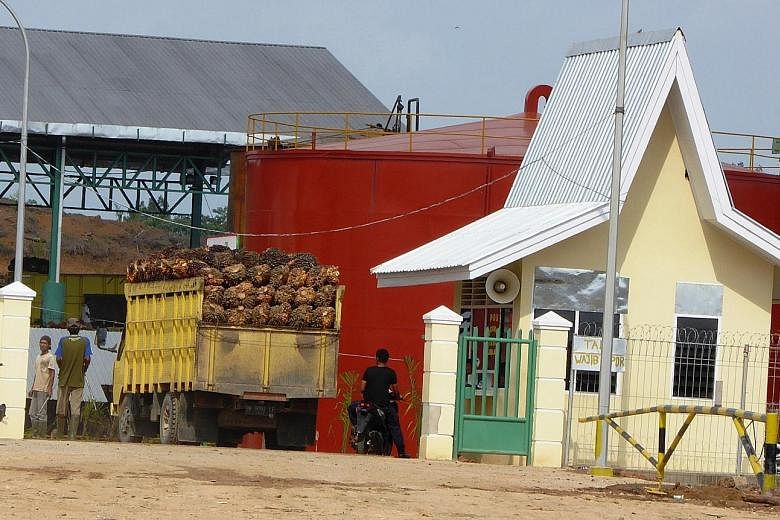Indonesia is getting more serious about forcing major palm oil companies in the country to abandon a landmark "zero deforestation" pact over cartel allegations.
The government says the 2014 Indonesia Palm Oil Pledge, or Ipop, is hurting smallholder producers who cannot afford to adopt sustainable forestry practices under the treaty.
The world's largest producer of palm oil is now trying to establish a legal basis to disband the environmental agreement designed to promote sustainable practices.
"The point is that we oppose the Ipop," Agriculture Ministry plantations director-general Gamal Nasir was reported as saying by The Jakarta Post on Tuesday.
"The Business Competition Supervisory Commission (KPPU) has issued a letter saying that there are indications of a cartel in the Ipop," he added.
-
Ipop a voluntary pact by palm oil firms
-
The Indonesian Palm Oil Pledge, or Ipop, is a zero deforestation pact signed by leading palm oil producers in Indonesia to promote sustainable agro-forestry practices.
A key plank is that members buy oil palm only from farmers who practise sustainable cultivation. Other key elements include proactive government engagement on policy reform and a principle of no planting in high-carbon stock areas or peatlands.
The Ipop standard is voluntary and applies only to signatories who commit to ban clearing on four types of land: primary forest, peatland, secondary forest and bushland.
Critics of the pledge say it conflicts with the Indonesian Sustainable Palm Oil (Ispo) standard, largely a certification for legal compliance issued the government.
Ispo certification is mandatory for oil palm plantations and processing firms, which had to comply by the end of 2014 or face sanctions.
However, only a few companies in Indonesia are Ispo-certified. Many feel more obliged to obtain the voluntary but more globally recognised Roundtable on Sustainable Palm Oil certification.
Arlina Arshad
"We will coordinate with the KPPU first and that letter can be used as a basis for its disbandment."
The KPPU has alleged that farmers are being squeezed out because they cannot afford to adopt the sustainable forestry practices under Ipop, and as a result, a cartel-like monopoly is created by the signatories.
Firms that have signed the pledge include Asian Agri, Astra Agro Lestari, Cargill, Golden Agri-Resources, Musim Mas and Wilmar International.
Mr Gamal accused Ipop of caving in to pressure from foreign players, arguing that the pledge is at odds with the Indonesian Sustainable Palm Oil (Ispo) certification standard, which only bans land-clearing in primary forests and peatlands.
Ipop, however, goes further by banning land-clearing in secondary forests and bushlands that have high carbon content.
"That clearly violates the (Constitution) as it stipulates that natural resources have to be utilised for the people's welfare," he added.
Announced at the United Nations Climate Summit in 2014, Ipop commits palm oil firms to make their supply chains more sustainable.
KPPU chairman Muhammad Syarkawi Rauf, however, told The Straits Times yesterday that the agreement could be used as an "instrument to create barriers to entry" and confirmed that a team was now studying Ipop for possible violations to competition laws.
"The small-time farmers will not be able to sell their products to these dominant players. There are suspicions and early indications of cartel practices and we are currently studying it again," he said.
"The government should be the one to determine standards for industry practices, not the companies themselves."
Experts such as Greenpeace Indonesia campaign adviser Bustar Maitar, however, said the latest move by Jakarta is "like taking two steps backwards, after a step forward".
"So many companies are already not complying with current regulations, while the international market is demanding the highest standard," said Mr Bustar yesterday.
"We play a critical role and it all depends on us. Indonesia should support the best standards available now, which is the Ipop."
There are other ways for the government to deal with anti-competition practices, said Friends of the Earth Indonesia (Walhi) executive director Abetnego Tarigan. "Not everything should be viewed as a threat. In the first place, it's only a pledge, which is non-binding."
Meanwhile, the Environment and Forestry Ministry is studying the implications of Ipop closely.
Ms Vanda Mutia Dewi, executive director of think-tank Greenomics Indonesia, said she presented her observations on Ipop to Environment and Forestry Minister Siti Nurbaya Bakar last week.
"Ipop can be used to reduce deforestation as long as it is tightly monitored," Ms Vanda said.

